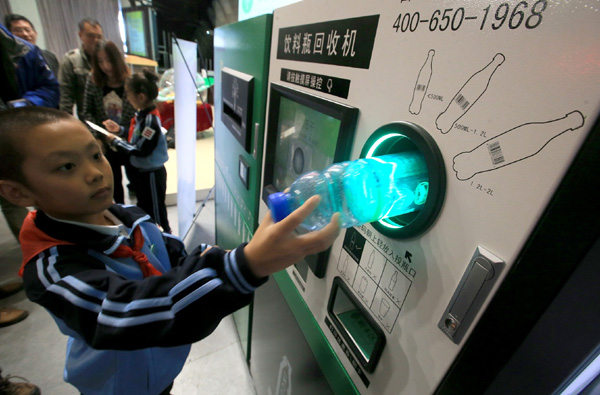'Reverse' vending machine sells idea of recycling
|
Students place empty bottles in a reverse vending machine, which accepts used containers in exchange for money to the user, at the primary school attached to Capital Normal University. Hao Yaxin / for China Daily |
Beijing's primary and middle schools will get "reverse" vending machines, which pay out coins and stationary in exchange for empty bottles or used books, as part of efforts to boost recycling.
Thousands of the machines will be placed at more than 2,000 schools to ensure waste on campus is recycled and to avoid secondary pollution when the waste ends up in illegal underground workshops.
"More than 1.5 million students will benefit from the program and get into the habit of trash classification and recycling," said Li Yongkai from the Beijing Education Commission.
The process begins with students feeding used bottles or books into the machine, which identifies the items with an imaging camera, then compacts and sorts them into a bin.
Users will be rewarded with a pencil or coins, or can have it donated to underprivileged children in rural areas.
The machines, released in August mainly at subway stations and airports, have collected more than 20,000 PET bottles that can be recycled to make new bottles without waste going to landfills.
In the future they will also collect electronic waste, in addition to plastic bottles and paper, said Chang Tao, director of INCOM, the producer of the machines.
The machines could later be placed in shopping areas, universities and institutes, as well as communities, he said.
Ren Lianhai, a professor at Beijing Technology and Business University's environmental science and engineering department, said placing the machines across the city is "beneficial for the city's recycling economy in the long run".
"Countries such as Japan and Brazil have had such machines in use for years, and they have been well received," he said.
The reverse vending machine has also been well received by many primary and secondary school students.
Li Changxuan, a 9-year-old at the primary school attached to Capital Normal University, found it was "fun as well as worthwhile to exchange some empty bottles for a new pencil".
Experts said the widespread use of the machine is believed to promote recycling, which has been poorly conducted in the past few decades.
The machines could later be placed in shopping areas, universities and institutes, as well as communities, authorities said.
zhengxin@chinadaily.com.cn



















